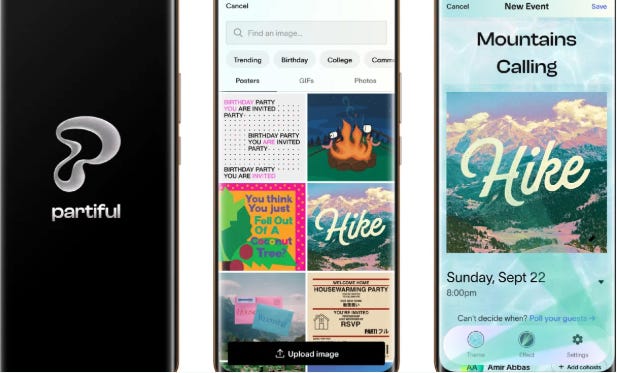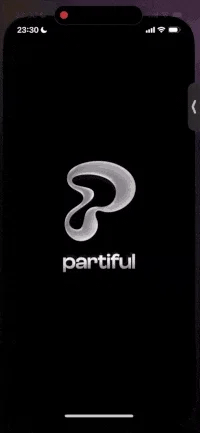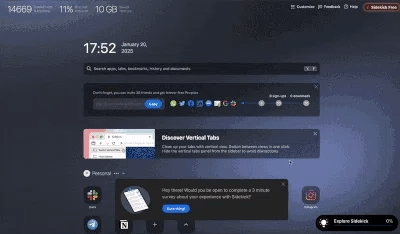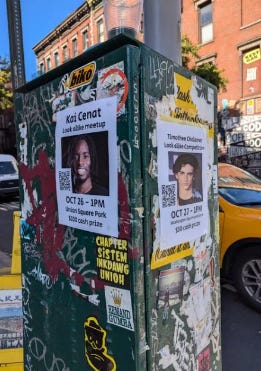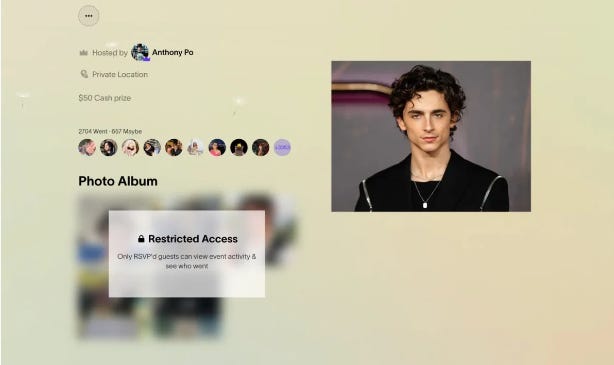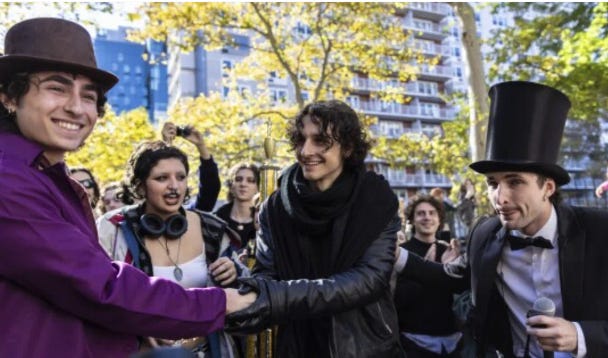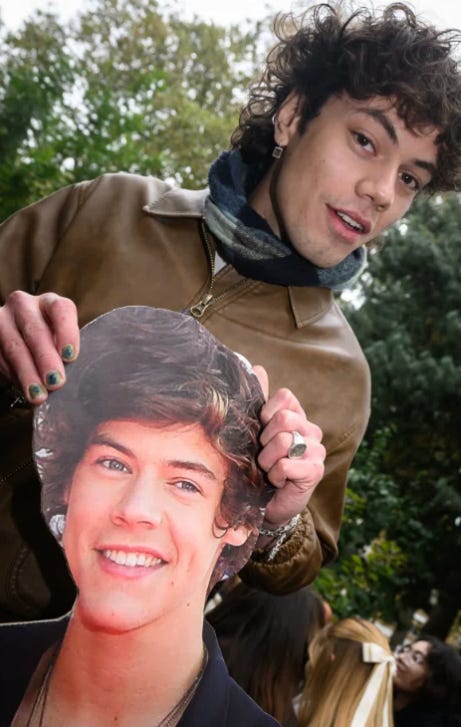Inside the Secret Program Turning College Students Into Party Influencers
Partiful: The Gen Z Party Planner That Redefines Social Gatherings
Partiful: The Gen Z Party Planner That Redefines Social Gatherings
In an era overflowing with social apps and event tools, Partiful emerges not just as another event planning platform, but as a cultural artifact of a new digital generation. While it may look, at first glance, like a close cousin of Luma or Eventbrite, Partiful distinguishes itself with a visual and emotional language crafted for the Gen Z soul — playful, nostalgic, and unapologetically expressive.
What Is Partiful?
At its core, Partiful is an app designed to simplify the chaos of party planning. But calling it a party planning app feels reductive. In the same way that TikTok is not merely a video platform but a cultural engine, Partiful is more than just a tool to organize get-togethers — it's a canvas for self-expression.
Where previous generations cobbled together invites through Snap threads, overloaded Discord chats, or even clunky Facebook groups, Partiful offers a refreshingly clean alternative. In seconds, users can whip up a stylish, custom party page that feels more like a personal zine than a form submission. With a few taps, you're not just planning a party — you’re broadcasting your vibe.
An Experience, Not a Form
To use Partiful is to experience a blend of retro aesthetics and modern sensibility. The interface is delightfully kinetic — animations bounce with charm, interactions feel frictionless, and the entire design whispers fun. Invites are crafted and sent with the breezy confidence of posting a meme. And once the party’s over? Guests can upload photos to the event page, creating a shared visual diary of the night’s memories.
Unlike most platforms, no account is needed to start — a deliberate move that lowers the barrier to entry. Of course, as users begin customizing, uploading, and engaging deeper with the tool, registration becomes inevitable — and at that point, welcomed.
The Self-Expression Layer
What sets Partiful apart from utility-first platforms is its embrace of personality. Much like ephemeral social spaces such as Shelf, Airbuds, or Noplace, Partiful thrives because it becomes a mirror — a way for users to articulate identity. It’s not just about what you’re planning — it’s about how you want it to feel, and who you want to be seen as.
Why Partiful Works
Beyond the charm, Partiful is a well-oiled machine of modern event logistics. Hosts can easily collect payments for paid events through Venmo, Zelle, or PayPal — a nod to the financial habits of digitally native college students. They can also set guest limits, manage waitlists, and send out reminders via text (not email), making it feel like a conversation rather than a calendar alert.
That text-first communication is no accident — Partiful was clearly designed with iMessage in mind. In the U.S., particularly among college students, iMessage isn’t a feature — it’s a default. And Partiful’s integration into that flow is both seamless and smart.
For Guests, Too
Even for attendees, the experience is more than transactional. Guests can see which of their friends are attending, share photos directly on the event page, and relive the moment without the fragmented chaos of group chats. It's party planning with a memory lane built in.
The Bigger Picture
Partiful isn’t just helping people throw parties — it’s reimagining how we organize offline experiences in a way that feels online-native. It’s a product that understands its audience not as users, but as characters in their own social narratives.
And in a digital world full of sterile RSVPs and endless notifications, Partiful gives you something warmer: a neon-tinted, slightly ironic, wholly personal invitation to be yourself — and bring your friends along for the ride.
User Acquisition Strategy
Timothée Chalamet Lookalike Contest Sparked a Viral Sensation
In the frenzied world of Gen Z marketing, where TikTok ads and college ambassador programs have become table stakes, true standout moments demand more — something stranger, louder, and impossible to scroll past. Enter Partiful, the event planning app that turned heads not with a banner campaign or a celebrity endorsement, but with a surreal, chaotic, and undeniably brilliant stunt: a Timothée Chalamet lookalike contest.
Yes, that Timothée — the tousle-haired prince of indie cinema, star of Dune and Wonka. But this wasn’t just about paying tribute. It was about turning the streets of New York into a living meme.
The Setup
In the saturated space of event discovery, Partiful had a question on its hands: how do you capture attention when every brand is chasing the same playbook?
The answer came in the form of a collaboration with Anthpo (Anthony Potero), a Brooklyn-based YouTuber with 2 million subscribers, known for his absurdist, performance-art-style content — think: eating hundreds of cheese balls in public dressed as “Cheese Ball Man.” With his finger firmly on the pulse of internet culture and his roots in NYC, he was the perfect conduit for chaos.
Together, they launched the Timothée Chalamet Lookalike Championship.
Flyers went up across downtown Manhattan in the days leading up to Halloween, featuring a cryptic QR code that led — not to a promo video, not to a website — but to a Partiful event page. For most people, this was their first encounter with the app. The invitation was slick, unexpected, and filled with just enough irony to make it shareable.
The prize? Fifty dollars for the best Chalamet doppelgänger.
The Scene
The event was held in Washington Square Park. Over 3,000 RSVPs flooded in through Partiful.
Hundreds of Chalamet clones gathered, dressed in moody trench coats, pastel cardigans, tousled wigs, and glazed stares. Then, just as the crowd hit peak density, the Timothée Chalamet appeared — in the flesh. The real Wonka, grinning amid his mirror world.
Panic. Elation. Photos. Screams.
The NYPD, unamused by the scale and the lack of permits, imposed a $500 fine for hosting an unauthorized public gathering. Four attendees were arrested in the chaos. But by then, the event had already gone supernova on TikTok and X.
The Fallout — and the Format
The Chalamet contest didn’t just go viral — it sparked a global trend. Lookalike contests began popping up in major cities across the world:
Dublin: Paul Mescal Contest
London: Harry Styles Doppelgänger Showdown
San Francisco: Dev Patel Lookalike Competition
Chicago: Jeremy Allen White-Off
Brooklyn: Zayn Malik Mirror Match
Each event followed the same playbook: slightly absurd, deeply shareable, and centered on hyper-recognizable faces. And behind the scenes? Always, Partiful.
The Role of Partiful
This was more than a sponsorship. Partiful didn’t just stamp its logo on an event — it powered it.
Event Creation: Anthpo used Partiful to design and distribute the event page, which served as the hub for RSVP, info, and promotion.
Participant Management: The app streamlined registrations from thousands, providing a lightweight but highly functional system.
Financial Backing: Partiful covered contest costs — offering $50 to every single lookalike who entered — and even reimbursed the $500 NYPD fine incurred by Anthpo.
Influencer Spend: While figures aren’t disclosed, estimates suggest Partiful spent well over $100,000 in total, including influencer fees and event costs.
It worked. Not just in NYC, but worldwide — because the idea was infinitely repeatable, with endless celebrity templates to remix.
Why It Worked
Several forces collided to create the perfect storm:
The contest aligned perfectly with the Halloween season.
The imagery — a sea of faux Timothées — was absurd, memeable, and instantly viral.
The real Chalamet's surprise appearance added rocket fuel.
Most importantly, the format was modular, adaptable, and low-lift — the kind of idea that any city, any fandom, could replicate.
A Look from the Ground
One attendee — a local New Yorker — captured the spirit of the event in a blog post:
"I was walking through downtown Manhattan when I spotted a flyer for a Timothée Chalamet Lookalike Contest. Naturally, I added it to my calendar — it felt like civic duty. It happened to be the day after my birthday, so I dragged my friends along to celebrate. Somehow, I knew Sir Wonka himself would show up. And he did.
From where I stood (all 5’4” of me), I could just about make out a hundred Chalamet clones, one actual Timothée, some very frantic media people, and eventually, a couple of handcuffs.
It was bizarre, beautiful, and honestly the most fitting way to end my birthday weekend."
A New Playbook for Virality
Partiful didn’t chase virality. It engineered it.
By leaning into chaos, tapping into fan culture, and partnering with creators who understand how the internet feels, they made an event that transcended utility. It wasn't just about throwing a party — it was about becoming part of the story.
In the process, they turned thousands of first-time users into participants in a collective, cultural moment — and made Partiful the quiet hero behind the scenes of a very loud event.
Inside Partiful’s Growth Playbook
How a UCLA Ambassador Sees the Party Planning App Evolve
Keep reading with a 7-day free trial
Subscribe to Consumer App Lab to keep reading this post and get 7 days of free access to the full post archives.


